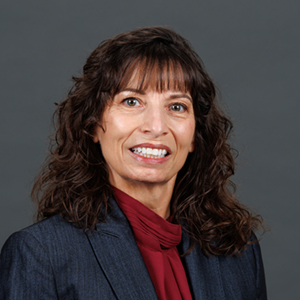
Shortly after Cahleen Shrier, Ph.D., joined the faculty in the Department of Biology and Chemistry at APU, she became intrigued by the research her colleagues Les Eddington, Ph.D., and David Cherney, Ph.D., had done on the crucifixion of Jesus. They gave her their notes and articles and Shrier continued the research. She then developed a lecture on the physiological process of the crucifixion and wrote an article for APU Life based on her lecture. Over the years, the article and lecture have received much acclaim from the APU community and beyond. Many have shared that they see Christ's death on the cross with a newer and greater understanding as a result of Shrier's special lecture. As Shrier prepares to share her presentation again in the coming Easter season, she answers questions about the personal impact it has had on herself and others over the years.
APU: Are you surprised by the response this lecture and article have received?
Shrier: Several of the students have responded very positively. I often get at least one or two emails after a lecture and they say how meaningful it was. Often even non-Christians have expressed how important this topic is and realize what Christ had done for them.
One student wrote to me in regards to hearing about the physiology of the crucifixion and said, "I heard you give the talk and still remember it very vividly today over 10 years later. I just wanted you to know how powerful that talk is. I hope you are still giving that talk to your students these days."
APU: Is it hard for you to give this talk each year?
Shrier: It is these comments [from the student above] that help me be able to give it the next year because it does take a lot out of me emotionally. I think it's an important talk for students to understand how much God really does love them and what Christ did for them. It's very encouraging when students give me positive feedback, which encourages me to tell other students. There are times in our traditions we look to the resurrection, and that's important for our belief in Christianity. But if Jesus didn't die, He wouldn't have been resurrected and we need to also celebrate his death—not in the sense that it makes us happy, but rather in the understanding of what Christ did for us.
APU: How has this article and lecture effected your faith?
Shrier: This talk speaks to me spiritually again about what Christ did. Sometimes I think we can get very calloused in our understanding. We might look at a crucifix or some pictures of the crucifixion and because we are just so familiar with it, we tend to not take in deeply its meaning. Or, for instance, we might take communion at the end of the service and then leave and not really reflect on what it means. I think it allows me to take communion in a more meaningful way; it allows me to be reassured, have hope, and be encouraged about God's love for me and my purpose that He's designed me for.
APU: What does the Easter season mean to you?
Shrier: The Easter season for me is a key time for Christians to celebrate Christ's resurrection and the hope of eternal life. This is a great time of the year to get together in community and individually to celebrate what Christ has done for us.
Read "The Science of the Crucifixtion" here.
To contact the featured experts, please call Rachel White, Executive Director of Strategic Communication , at (626) 815-4502, or email rewhite@apu.edu.